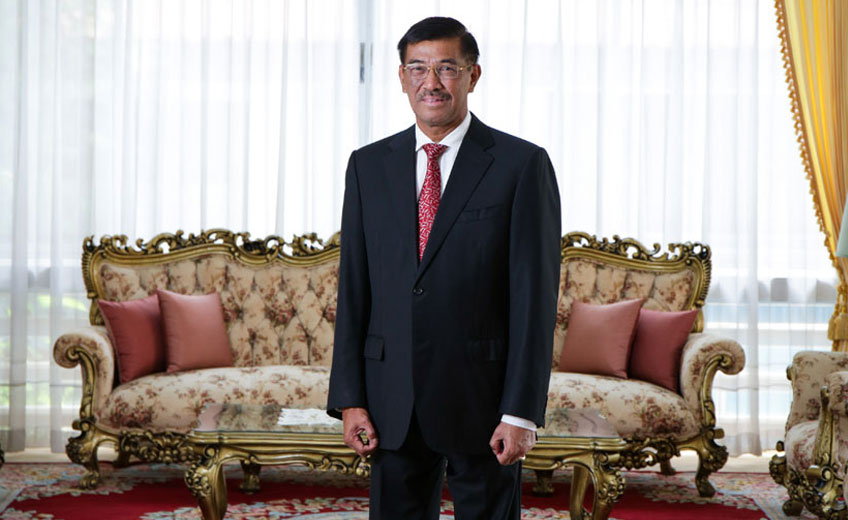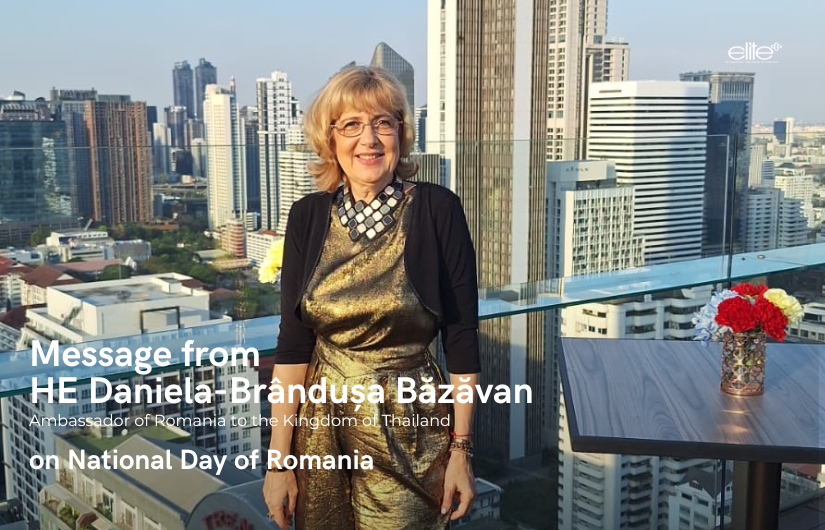Recently assuming his position as ambassador of the Republic of Indonesia to Thailand, HE Ahmad Rusdi had previously been posted in countries in Asia and Europe including the Czech Republic, Pakistan and Britain. Over the course of his service, under seven Indonesian presidents so far, Ambassador Rusdi has inculcated his expertise and experience not only as a leader at Indonesian embassies but also as a high ranking official in the Ministry of Foreign Affairs. A graceful talker whose free time is dedicated to sports and travel, Ambassador Rusdi sat down with Elite+ to discuss Indonesian affairs, his country’s role in ASEAN and his mission in Thailand.
- What are Indonesia’s long-term plans for economic development?
The government currently has two economic development plans: the National Long-Term Development Plan (RPJPN) and the National Medium-Term Development Plan (RPJMN). The long-term plan, which lasts until 2025, is to make Indonesia a developed and self-reliant, just and democratic, peaceful and united country. We want to make our economy independent from other countries, not relying on anyone, especially for basic necessities. We also want it fair and prosperous. Under the administration of President Joko Widodo, we focus on the five backbone segments, which are agriculture, fisheries, energy, industry and tourism.
- What are Indonesia’s major exports and imports?
Indonesia is known as a traditional exporter of 10 products: textiles, electronics, rubber, palm oil, forest products, footwear, automotive parts, shrimps, cocoa and coffee. We have also been exporting oil and natural gas, coal, minerals and chemical products. We are establishing the exports of leather and leather products, medical appliances, medicinal herbs, processed food, essential oils, seafood, handicrafts, jewellery and spices.
As for imports, we import lots of food due to high demand and limited national production. We also import raw materials for the manufacturing industry as well as capital goods like machinery and transport equipment.
- What segments are open to foreign investment and what are the incentives?
The Ministry of Industry has set up six segments for foreign investors. They are labour-intensive industries, small and mediumsized enterprises (SMEs), capital goods, natural resource-based industries, high-growth industries including automotive, and electronics and telematics.
There are many incentives for foreign investment. Under the 13th edition of the economic policy package, we have launched three-hour investment licence services for industrial estate investments, and have introduced a new negative investments list. The edition also includes 100% FDI on distribution affi liated with production, raw materials for the pharmacy industry, e-commerce in partnership with SMEs, as well as the fi lm and tourism industries.
On the tax part, we have import duty exemptions, tax allowance and tax holidays. Value added tax exemptions are given to ship building, railway, airplane and spare parts industries. Indonesia gives tax incentives for labour intensive industries with specifi c criteria.
- Indonesia currently has a trade defi cit with Thailand is this an issue for you?
Negative balances of trade are common at times for every country. The embassy’s role is to facilitate and support collaborations that benefit both Indonesia and our foreign trade partners. The existing collaborations and partnerships include Pertamina and PTT, who have joined hands to make oil lubricants. Thai Lion Air is an associate company of Lion Air, an Indonesian airliner. The Indonesian government and entrepreneurs always seek to partner with Thais. Our trade minister’s recent visit to Bangkok gathered over 20 Thai CEOs from leading companies where trade and investment across all sectors were discussed. That is the kind of event the embassy encourages and is directly involved in.
- Are there any large infrastructure projects the government plans to complete in the near future?
Infrastructure has always been developed in Indonesia to serve our people and encourage investment opportunities. We have constructed 35 megawatt power plants, 163 ports, 15 airports, 1,646 miles of roads, 2,024 miles of railways, 49 dams and irrigation systems amounting to an area of one million hectares, and many more.
- What are some of the bilateral collaborations between Thailand and Indonesia?
Since 1950, the year our diplomatic relationship was established, bilateral relations have grown steadily and covered all aspects, be it politics and security, economics, trade, social, culture or education. Our country leaders constantly contact and exchange visits to strengthen mutual understanding between the governments and people. We have worked together to make ASEAN and other regional groups and mechanisms stronger and more prosperous.
- How do you plan to enhance relations between Thailand and Indonesia?
The embassy will continue to strengthen our governments’ relations such as by encouraging exchange visits of top-level leaders. Soon we will materialize the plan of the Indonesian president’s visit to Thailand. We will continue to facilitate economic and trade collaborations, especially via the creative economy and tourism industry. Another area of collaboration we focus on is education, which is operated on a people-to-people level. The emphasis is on exchanging knowledge of information and technology.
- What role does Indonesia play in ASEAN?
As one of the founding fathers of ASEAN, we are committed to making ASEAN a solid and efficient regional organization. Indonesia has always been active in promoting ASEAN in other regional groupings and mechanisms to achieve security, peace and prosperity in our region. To name a few, our roles and contributions have been initiating the ASEAN Security Community, active promotion of human rights and as mediator to resolve confl icts among Southeast Asian countries and bring peace in our region.
- How does the government plan to develop human resources to compete in ASEAN?
There are a few initiatives and projects conducted to improve the quality of our human resources to be able to compete in a competitive ASEAN. These are setting 85 national competency standards of Indonesia (SKKNI), the accreditation of 725 job training sectors provided by the private sector, increasing the number and improving the quality of vocational schools, and training to create skilled and semi-skilled labour. We have also continuously improved education curriculums to serve ASEAN and world demands for human resources.
- Does Indonesia emphasize sustainable tourism? How can regional ecotourism be promoted?
Realizing that Indonesia has huge potential in the tourism sector, which contributes significantly to the nation’s economy, the government aims for sustainable development of this industry. We are working hard to develop human resources in tourism, creating a people’s economy and environmentally friendly tourism.
In June, the Indonesian minister of tourism met with other ASEAN tourism ministers in Laos. They signed the Pakse Declaration on a roadmap for strategic development of ecotourism clusters and tourism corridors. This declaration focuses on outlining a partnership plan in sustainably using natural resources, bringing economic benefits to locals in rural areas and developing the sub-regional ecotourism network.
- August saw the 71st anniversary of Indonesia’s Independence Day. Did the embassy celebrate?
In commemoration of the 71st anniversary of Indonesia’s Independence Day, the embassy organized a golf tournament on September 15 at the Summit Windmill Golf Club, Bangkok. The tournament was joined by more than 130 golfers, some of whom were ambassadors and staff of foreign diplomatic missions in Bangkok, offi cials of the royal Thai government, CEOs and the private sector. The event was great fun and I saw it as a way to strengthen friendship among those who joined.


























































































































































































































































































































































































































































































































































































































































































































































































































































































































